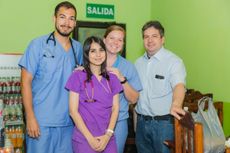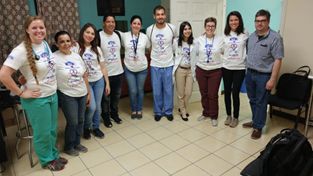
Since the summer of 2010, Dr. Cynthia Tracy and her GW cardiology colleagues have been traveling to Comayagua, Honduras to provide electrophysiology care at Centro Medico Comayagua Colonial Hospital. The high prevalence of Chagas in Honduras results in many adults with conduction abnormalities in need of pacemakers. During the two-week mission, the GW team evaluates heart failure and arrhythmia patients, implanting free pacemakers and defibrillators in at-risk patients. The Cardiology Brigade has acquired more the $2,500,000 in donated cardiac devices and has gained national popularity. Some patients travel up to seven hours to be evaluated by the Brigade.

GWIMRes has been fortunate to allow three of our residents to join the Brigade. Dr. Ivan Peña (Res'18, current cardiology fellow with Hofstra Northwell Cardiovascular Disease Fellowship Program) was the first resident invited to participate. Dr. Peña traveled with the Brigade during his PGY2 and PGY3 years. This year, Dr. Rachel Volke (PGY2) and Dr. Pedro Covas (PGY2) participated in the Brigade.
Dr. Rachel Volke, PGY2, speaks about her recent experience with the Brigade.
The cardiology brigade to Honduras led by Dr. Tracy and Dr. Mercader was an incredible elective experience both for the in-depth hands on learning about cardiology and the opportunity to be a part of a project making a lasting impact in the cardiovascular health of Hondurans. I was fortunate to be able to participate in this two week cardiology brigade during their ninth annual trip to Comayagua this September. The brigade saw more than 300 patients in two weeks and implanted 49 pacemakers and defibrillators. In total over the past 9 years they have implanted 322 devices in patients with cardiovascular disease ranging from third degree heart block to secondary prevention in prior VT/VF arrests. Patients who receive devices return year after year for annual checkups and interrogations of their devices and for battery changes when their devices run low. In Honduras the cost of a pacemakers and defibrillators is out of reach for the average person and the national public health system is unable to provide devices in most cases. This leaves a huge unmet need in a country where endemic Chagas disease is a frequent cause of 3rd degree heart block in elderly patients contributing to significant symptom burdens. A number of the patients referred to the brigade were in 3rd degree heart block with heart rates in the 30s. Only in their 50s and 60s, these patients were confined to beds or wheelchairs for the majority of the day, unable to do even the most basic activities like cooking and walking because of their fatigue and dyspnea. Implanting a pacemaker that improves their resting heart rate from the 30s to the 60s has a huge impact on their energy levels and allows many of them to get back to a regular life. It was amazing to see the dramatic transformation in patients before and after receiving these pacemakers. I think at home it's often taken for granted all of the medical technology we have access to. Seeing the tangible impact these donated devices had on our patients was both a humbling and motivating experience. I hope in the future to be able to participate and contribute to this inspiring mission again.